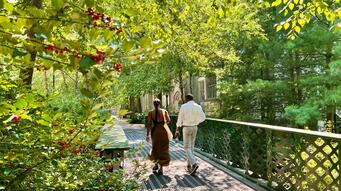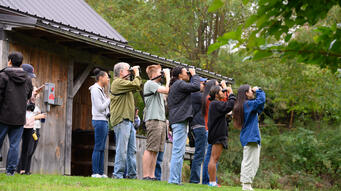Stewardship
Land, Water, Life
Yale’s Efforts
- Inspired by student research and recommendations, Yale has installed multiple urban meadows and rain gardens throughout campus.
- The Yale Landscape Lab at West Campus, and the Yale Experimental Watershed host fieldwork and research projects, and offer opportunities to connect sustainability solutions to the natural and built environment.
- More than 8,000 trees have been planted in the City of New Haven through the Urban Resources Initiative, a not-for-profit-university partnership. Over 130 of the these are on campus, 48 of which recognize Yale employees for long-term service.
- Initiatives in Yale’s Sustainable Stormwater Management Plan aim to reduce the amount of stormwater runoff from campus, improving water quality and public health.
- Yale’s Water Management Plan recognizes water as a critical resource, promotes metering, conservation technologies and conservation research, and prioritizes adaptive management strategies.
What You Can Do
- Help us save water on campus by being conscientious of your use.
- Discover Yale’s many green spaces that help to manage stormwater.
- Join the many students, faculty and staff who participate annually in bird walks on campus and citizen science events to survey and record biodiversity on campus.
Our Objectives and Goals
Urban Growth and Campus Planning
Develop transformative approaches to urban growth and campus planning that address financial, environmental, and social imperatives
Yale Divinity School’s newly opened Living Village, a residential building that will give back to the environment more than it takes, features advanced systems for water management. The building’s water systems were engineered to collect rainwater from the roof and condensate from mechanical equipment, store it in two huge underground cisterns, and then treat it so it can be reused for irrigation and laundry washing. Wastewater from showers, toilets, and sinks goes through a “closed loop” series of filters, UV lighting, and a constructed wetland to reduce contaminants and is then reused as gray water in toilets and drip irrigation. The underlying goal is to steward water with theologically driven care as a reflection of the Yale Divinity community’s values.
Campus Land Use Planning Guidelines
By 2025, complete the update to the Framework for Campus Planning.
An update to the Framework for Campus Planning was drafted in 2025. The update summarizes campus development over the last quarter century and supports a future Comprehensive Campus Plan.
Efficient Campus Growth
By 2020, develop and implement planning strategies to efficiently accommodate increased campus population and programmatic expansion.
This goal was achieved in 2020 when Facilities Planning adopted an approach to new buildings and renovations that maximizes efficiency by using flexible workspace principles. In 2025, we developed a flexible workspace approach specific to laboratory ventilation. By matching ventilation levels and equipment to specific risk factors, we have identified approximately 20 percent energy use savings across six existing buildings and systems while improving workspace flexibility in labs.
Land and Water Management
Develop innovative approaches to land and water management that enhance human health, biodiversity, and environmental vitality
Landscape Management and Use
By 2021, define standards for innovative landscape management to enhance care and use of Yale land inside and outside of New Haven.
This goal was achieved in 2021. In 2025, a Tree Management Plan (TMP) for the Yale Golf Course was completed and we began updates to Yale’s comprehensive TMP. A donor gift established an endowment to plant new trees over the next four years. Wood is salvaged from 90 percent of trees removed on campus and repurposed locally into furniture and other wood products. The Grounds Maintenance Team has reinvigorated their commitment to reducing chemical use on campus and piloted a fraze mowing project at Yale’s Athletic fields to support this effort.
Stormwater and Water Management
By 2020, implement recommendations as proposed in 2016 supplements to campus Stormwater and Water Management Plans in explicit alignment with municipal, regional, and state priorities.
This original goal was achieved in 2020. Following the completion of a Stormwater Planning Study in 2023, improvements to infrastructure in flood-prone areas are being implemented. Updated stormwater design guidelines are pending approval. These establish best practices for placement and management of critical infrastructure relevant to flood risk and include clear planning thresholds for more severe weather and measures to protect key assets.
Biodiversity Plan
By 2025, establish campus best practices, standards, benchmarks, and biodiversity goals and strategies to meet and measure performance to create a campus biodiversity plan.
In 2025, Yale hired a landscape architect to oversee this body of work. A recently completed assessment of biodiversity plans at peer institutions will help inform future development of a landscape plan for the university. Yale Divinity School’s Living Village completed construction in 2025, exemplifying a biodiverse landscape for pollinators and food production. Continued efforts at Marsh Botanical Garden have cleared more areas of invasive vegetation, and projects in development are following these approaches.









